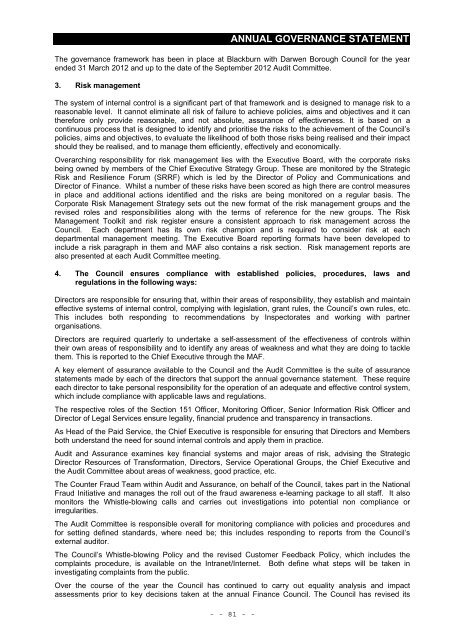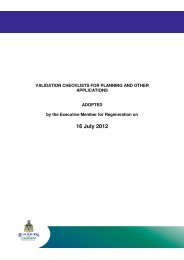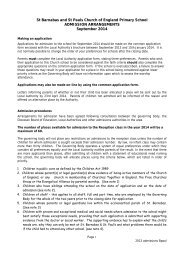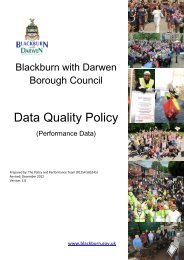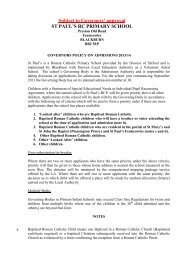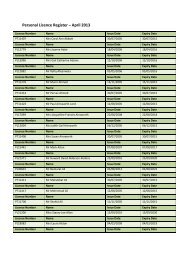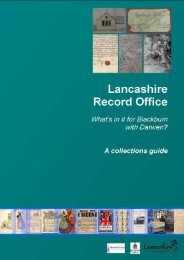Statement of Accounts 2011/2012 - Blackburn with Darwen Borough ...
Statement of Accounts 2011/2012 - Blackburn with Darwen Borough ...
Statement of Accounts 2011/2012 - Blackburn with Darwen Borough ...
You also want an ePaper? Increase the reach of your titles
YUMPU automatically turns print PDFs into web optimized ePapers that Google loves.
ANNUAL GOVERNANCE STATEMENT<br />
The governance framework has been in place at <strong>Blackburn</strong> <strong>with</strong> <strong>Darwen</strong> <strong>Borough</strong> Council for the year<br />
ended 31 March <strong>2012</strong> and up to the date <strong>of</strong> the September <strong>2012</strong> Audit Committee.<br />
3. Risk management<br />
The system <strong>of</strong> internal control is a significant part <strong>of</strong> that framework and is designed to manage risk to a<br />
reasonable level. It cannot eliminate all risk <strong>of</strong> failure to achieve policies, aims and objectives and it can<br />
therefore only provide reasonable, and not absolute, assurance <strong>of</strong> effectiveness. It is based on a<br />
continuous process that is designed to identify and prioritise the risks to the achievement <strong>of</strong> the Council’s<br />
policies, aims and objectives, to evaluate the likelihood <strong>of</strong> both those risks being realised and their impact<br />
should they be realised, and to manage them efficiently, effectively and economically.<br />
Overarching responsibility for risk management lies <strong>with</strong> the Executive Board, <strong>with</strong> the corporate risks<br />
being owned by members <strong>of</strong> the Chief Executive Strategy Group. These are monitored by the Strategic<br />
Risk and Resilience Forum (SRRF) which is led by the Director <strong>of</strong> Policy and Communications and<br />
Director <strong>of</strong> Finance. Whilst a number <strong>of</strong> these risks have been scored as high there are control measures<br />
in place and additional actions identified and the risks are being monitored on a regular basis. The<br />
Corporate Risk Management Strategy sets out the new format <strong>of</strong> the risk management groups and the<br />
revised roles and responsibilities along <strong>with</strong> the terms <strong>of</strong> reference for the new groups. The Risk<br />
Management Toolkit and risk register ensure a consistent approach to risk management across the<br />
Council. Each department has its own risk champion and is required to consider risk at each<br />
departmental management meeting. The Executive Board reporting formats have been developed to<br />
include a risk paragraph in them and MAF also contains a risk section. Risk management reports are<br />
also presented at each Audit Committee meeting.<br />
4. The Council ensures compliance <strong>with</strong> established policies, procedures, laws and<br />
regulations in the following ways:<br />
Directors are responsible for ensuring that, <strong>with</strong>in their areas <strong>of</strong> responsibility, they establish and maintain<br />
effective systems <strong>of</strong> internal control, complying <strong>with</strong> legislation, grant rules, the Council’s own rules, etc.<br />
This includes both responding to recommendations by Inspectorates and working <strong>with</strong> partner<br />
organisations.<br />
Directors are required quarterly to undertake a self-assessment <strong>of</strong> the effectiveness <strong>of</strong> controls <strong>with</strong>in<br />
their own areas <strong>of</strong> responsibility and to identify any areas <strong>of</strong> weakness and what they are doing to tackle<br />
them. This is reported to the Chief Executive through the MAF.<br />
A key element <strong>of</strong> assurance available to the Council and the Audit Committee is the suite <strong>of</strong> assurance<br />
statements made by each <strong>of</strong> the directors that support the annual governance statement. These require<br />
each director to take personal responsibility for the operation <strong>of</strong> an adequate and effective control system,<br />
which include compliance <strong>with</strong> applicable laws and regulations.<br />
The respective roles <strong>of</strong> the Section 151 Officer, Monitoring Officer, Senior Information Risk Officer and<br />
Director <strong>of</strong> Legal Services ensure legality, financial prudence and transparency in transactions.<br />
As Head <strong>of</strong> the Paid Service, the Chief Executive is responsible for ensuring that Directors and Members<br />
both understand the need for sound internal controls and apply them in practice.<br />
Audit and Assurance examines key financial systems and major areas <strong>of</strong> risk, advising the Strategic<br />
Director Resources <strong>of</strong> Transformation, Directors, Service Operational Groups, the Chief Executive and<br />
the Audit Committee about areas <strong>of</strong> weakness, good practice, etc.<br />
The Counter Fraud Team <strong>with</strong>in Audit and Assurance, on behalf <strong>of</strong> the Council, takes part in the National<br />
Fraud Initiative and manages the roll out <strong>of</strong> the fraud awareness e-learning package to all staff. It also<br />
monitors the Whistle-blowing calls and carries out investigations into potential non compliance or<br />
irregularities.<br />
The Audit Committee is responsible overall for monitoring compliance <strong>with</strong> policies and procedures and<br />
for setting defined standards, where need be; this includes responding to reports from the Council’s<br />
external auditor.<br />
The Council’s Whistle-blowing Policy and the revised Customer Feedback Policy, which includes the<br />
complaints procedure, is available on the Intranet/Internet. Both define what steps will be taken in<br />
investigating complaints from the public.<br />
Over the course <strong>of</strong> the year the Council has continued to carry out equality analysis and impact<br />
assessments prior to key decisions taken at the annual Finance Council. The Council has revised its<br />
- - 81 - -


